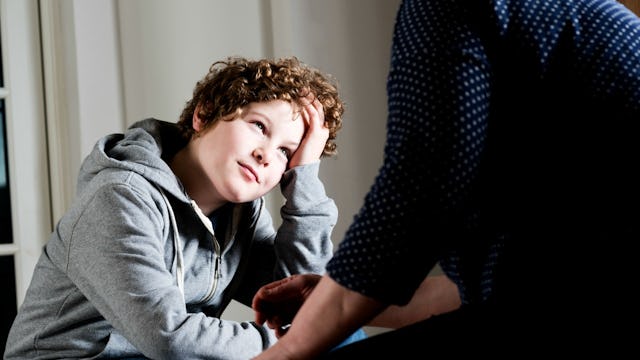Why I Don't Protect My Kids From Bad News

My two-year-old’s face was blank. Then it curved down into the slightest of frowns, as he stared at the open magazine’s page. As he’s usually a very expressive kid, I had never seen this look before.
But then, I had never read a line in a story quite like that: “This baby skunk lost its mother.”
The idea of anyone, even a skunk, losing her mommy stunned him. He had never thought of it before. While he’s seen Finding Nemo, he either didn’t remember it or didn’t understand what happened. But this was simply, devastatingly stated. Even if he had questions, he doesn’t have the words to ask them yet. So I just hugged him close.
While we moved on through the magazine, I know it’s just the start of a bigger conversation.
As my children get older, they’ll learn about pain and loss, as all people do as they grow into adulthood. But unlike a lot of kids, my children are both lucky and privileged — they’re white boys, from a upper middle-class household with both parents. Our family has never had any significant health or economic problems. We could choose to “keep them innocent” as long as possible.
But we don’t.
We don’t because other children don’t have that privilege. Black kids need to know about the racism they will eventually face. Kids who come from LBGTQ families need to know people may be prejudiced against their parents. Kids with disabilities or medical issues quickly become aware of how painful the world can be. Poor kids know the struggles of not knowing if the bills will get paid. Even though I was also privileged growing up, my mom told me about all of the stuff our family had — food, a house, both parents — that others even in the next town over didn’t. (And in reality, our town as well.) That detail brought the message home a hell of a lot more than “eat your food, there are kids starving in Africa.”
Like my parents did, we want to teach our kids to be sensitive to these realities instead of shielding them from it. Empathy isn’t magic — it’s taught and learned. In fact, if parents don’t push back against the racist, classist, and sexist bullshit of the world, kids pick up on it. That crap crawls down into your skin and isn’t easily pulled out. While you’re trying to “protect your kids,” the prejudices of the world seep in instead.
We also don’t shield our children because they need to see how I and my husband live out our values. Unless you learn otherwise, it’s easy to assume that your actions only have positive or neutral effects on other people. Unfortunately, our world is so much more complex than that. We want them to know why we buy from local farmers and companies that pay their employees good wages. Not seeing the big picture in the world — or refusing to care about it — is what led our country to much of the mess it’s in.
We want them to know about the bad stuff so they can know about the good stuff — and good people — too. As Fred Rogers said his mother told him when bad things happened: “Look for the helpers.” As our kids get older, they’ll see bad things no matter how much we try to protect them. With endless news streams, it’s easy to drown in bad news. If we prepare them now for how to react, they’ll be able to find and join the people making a difference.
None of this means that we tell them everything, every day. Even though I’m a climate justice activist, I haven’t explained climate change to my five-year-old yet. It’s just too overwhelming. Similarly, I didn’t tell them about the family separations at the border because it would probably give my older son nightmares. But it does mean that we thoughtfully, intentionally talk about difficult issues.
Even if we look away, pain and death and even injustice is in the world. While I didn’t expect Highlights magazine of all things to introduce my two-year-old to tragedy, I’m glad it did. Even if it’s as simple as a skunk losing her mommy.
This article was originally published on